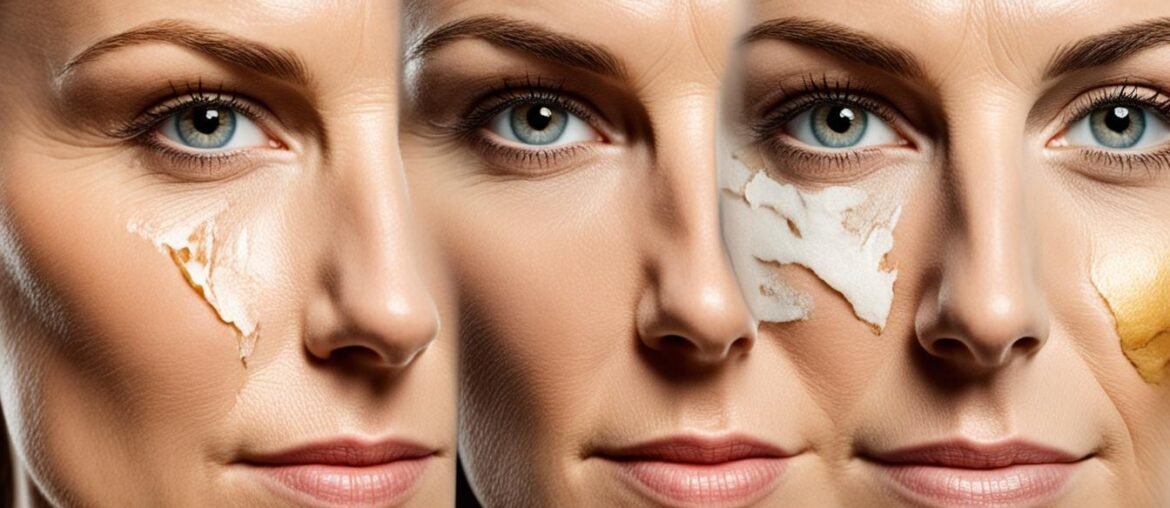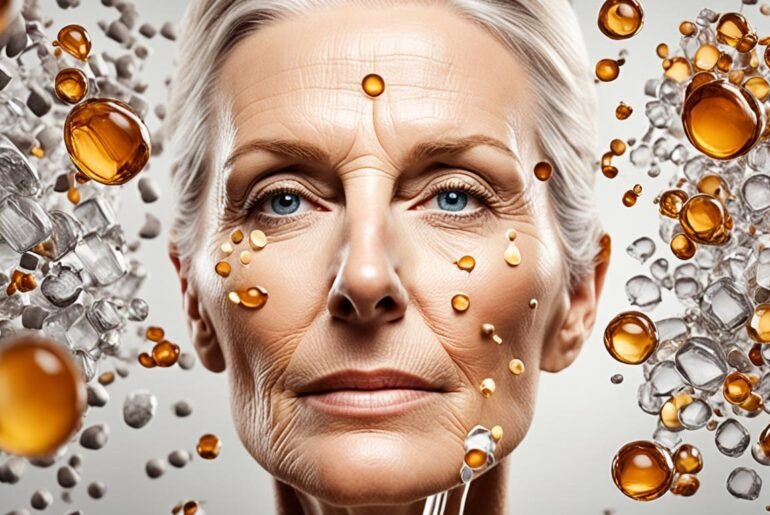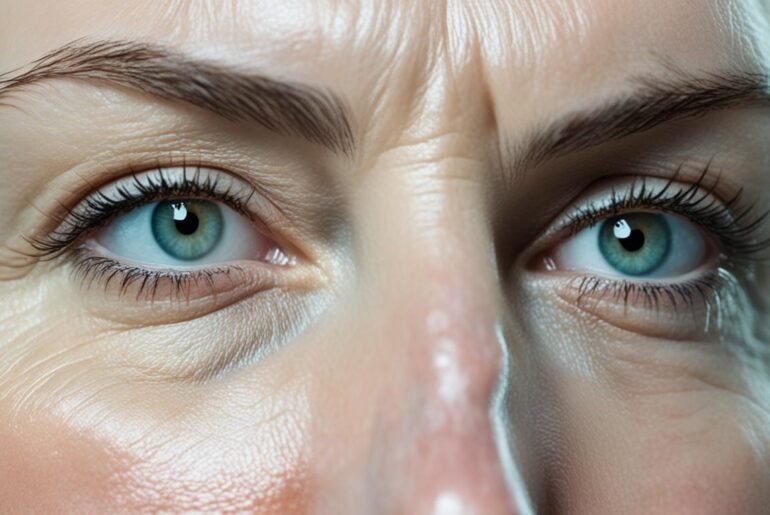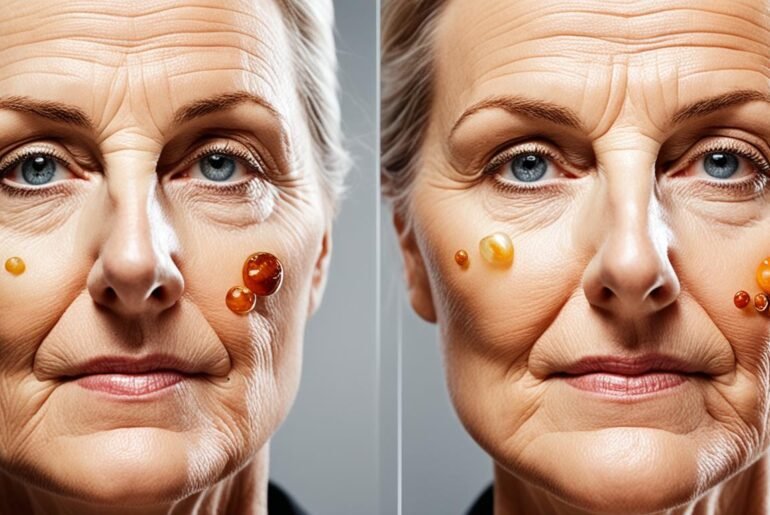Did you know that alcohol consumption can have a significant impact on the texture and aging of your skin? It’s true. Studies have shown that the effects of alcohol on skin health can be quite profound, leading to various alcohol-induced skin concerns and damage. From premature skin aging to a loss of skin elasticity, alcohol can wreak havoc on your complexion.
When we think about the role of alcohol in our lives, we often consider its effects on our liver and overall health. But what many people don’t realize is that alcohol can also have a detrimental impact on our skin.
Alcohol consumption depletes essential vitamins in the skin, leading to dehydration, inflammation, and a loss of skin elasticity. Heavy alcohol use can cause puffy and red faces, visible blood vessels, and increased risks of skin infections. Additionally, alcohol can disrupt sleep patterns, resulting in puffy eyes and a tired appearance.
If you’re concerned about maintaining healthy and youthful-looking skin, it’s important to understand how alcohol can affect your skin texture and accelerate the aging process. In this article, we’ll explore the various ways in which alcohol influences skin texture and aging, as well as the related skin concerns and damage caused by alcohol consumption.
Key Takeaways:
- Alcohol consumption can have a significant impact on the texture and aging of the skin.
- Alcohol depletes vitamins in the skin, leading to dehydration, inflammation, and a loss of skin elasticity.
- Heavy alcohol use can cause puffy and red faces, visible blood vessels, and increased risks of skin infections.
- Alcohol can disrupt sleep patterns, resulting in puffy eyes and a tired appearance.
- To maintain healthy and youthful skin, it’s important to minimize alcohol consumption and prioritize skincare routines and a healthy lifestyle.
The Effects of Alcohol on the Skin
Alcohol consumption can have detrimental effects on the skin, causing dehydration, inflammation, accelerated skin aging, and skin damage.
One of the primary effects of alcohol on the skin is dehydration. Alcohol depletes the skin’s hydration levels, leading to visible dryness and tightness. This can result in a dull complexion and an overall lack of moisture.
Furthermore, alcohol-induced inflammation is a common occurrence. When alcohol enters the bloodstream, it triggers a histamine reaction in the skin, causing redness, flushing, and irritation. Over time, continued alcohol consumption can lead to prominent facial redness.
Another significant impact of alcohol on the skin is accelerated aging. Alcohol consumption can contribute to the development of wrinkles, loss of skin elasticity, and a dull appearance. Collagen, a crucial component of the skin that provides structure and firmness, can be destroyed by excessive alcohol intake, making the visible damage difficult to reverse.
In addition to these effects, alcohol can also cause skin damage. Regular and heavy alcohol consumption can lead to various skin concerns such as spider veins, puffy face, and increased risks of skin infections.
To visualize the effects of alcohol on the skin, refer to the table below:
| Effects of Alcohol on the Skin | Description |
|---|---|
| Dehydration | Alcohol depletes the skin’s hydration levels, resulting in dryness and a lack of moisture. |
| Inflammation | Alcohol triggers a histamine reaction, causing redness, flushing, and irritation in the skin. |
| Accelerated Aging | Excessive alcohol consumption can lead to wrinkles, loss of skin elasticity, and a dull complexion. |
| Skin Damage | Alcohol can cause skin concerns such as spider veins, puffy face, and increased risks of infections. |
Alcohol’s Impact on Skin Texture and Aging
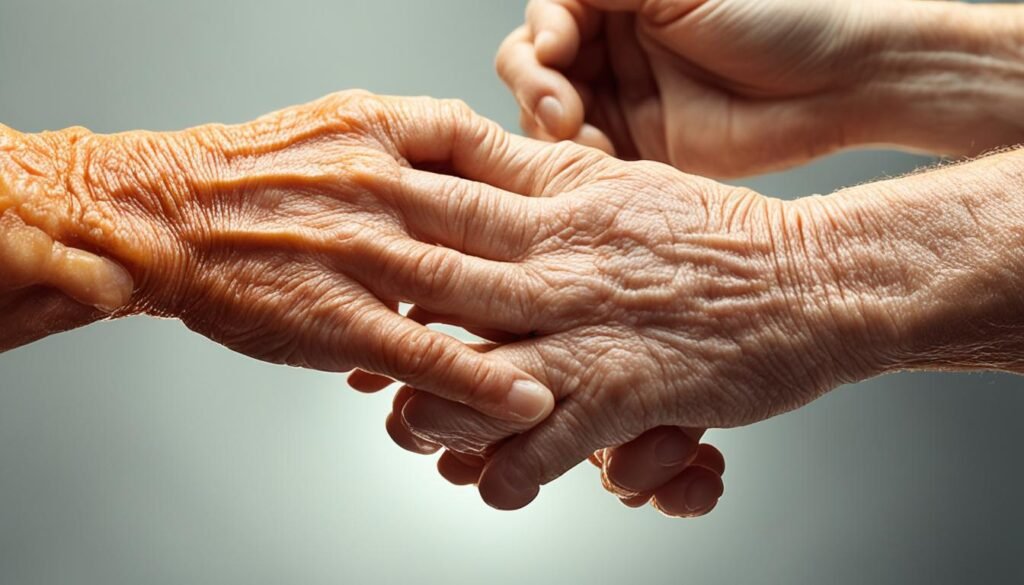
Alcohol consumption has a significant impact on the texture and aging of the skin. It affects the skin at a cellular level, leading to visible changes in skin texture and overall appearance. Regular and heavy alcohol use can cause a depletion of collagen, resulting in a loss of skin elasticity and the development of wrinkles. Collagen is a vital protein that provides structural support to the skin, keeping it firm and supple. When collagen levels are reduced, the skin loses its ability to bounce back, leading to sagging and a lack of resilience.
In addition to collagen depletion, alcohol consumption can impair the skin’s natural regeneration process. The skin undergoes a constant turnover, with new cells replacing old ones to maintain a healthy and youthful appearance. However, alcohol interferes with this process, hindering the skin’s ability to regenerate effectively. As a result, the skin may appear dull, tired, and prematurely aged.
Furthermore, prolonged alcohol consumption can cause a decrease in antioxidants within the skin. Antioxidants play a crucial role in protecting the skin from environmental damage and oxidative stress. When alcohol depletes antioxidants, the skin becomes more vulnerable to free radicals and other harmful factors, leading to premature aging and an increased risk of skin concerns.
It is important to note that alcohol’s impact on skin texture and aging is not limited to the face alone. The effects can be seen on various parts of the body, including the neck, chest, and hands. These areas may also experience a loss of elasticity and develop wrinkles due to alcohol-induced collagen depletion.
Overall, alcohol consumption can have a detrimental effect on skin texture and accelerate the aging process. To maintain healthy and youthful-looking skin, it is advisable to moderate alcohol intake and prioritize a comprehensive skincare routine that includes hydrating, nourishing, and protecting the skin.
The Relationship Between Alcohol and Skin Health
Understanding the relationship between alcohol and skin health is crucial in recognizing the potential impacts of alcohol consumption on our skin. Excessive alcohol consumption can have negative effects on various aspects of skin health, including the skin’s antioxidant defense, hydration levels, and inflammatory responses.
Alcohol’s Effect on the Skin’s Antioxidant Defense
The skin has its own natural defense system composed of antioxidants, which help protect against damage caused by free radicals and environmental factors. However, alcohol consumption can disrupt this delicate balance and compromise the skin’s antioxidant defense mechanism.
Alcohol-induced oxidative stress can lead to a decrease in antioxidants present in the skin, making it more susceptible to damage from UV radiation, pollution, and other harmful factors. This increased vulnerability can contribute to premature aging, the formation of wrinkles, and the development of skin diseases.
Alcohol and Skin Dehydration
One of the most noticeable effects of alcohol consumption on the skin is dehydration. Alcohol is a diuretic, meaning it increases urine production, which can lead to water loss in the body. This dehydration affects the skin’s ability to retain moisture, resulting in dryness, flakiness, and a dull complexion.
Without proper hydration, the skin’s natural barrier function may become compromised, allowing irritants to penetrate more easily and leading to increased sensitivity and inflammation.
Alcohol-Induced Skin Inflammation
Alcohol consumption can trigger skin inflammation, causing redness, irritation, and discomfort. Alcohol’s inflammatory effects are often attributed to its impact on blood vessels and immune responses in the skin.
When we consume alcohol, it can cause blood vessels in the skin to dilate, resulting in facial flushing and a persistent red appearance. In individuals with pre-existing skin conditions such as rosacea or eczema, alcohol-induced inflammation can exacerbate these conditions and lead to further skin damage.
Excessive alcohol consumption can disrupt the delicate balance of our skin’s antioxidant defense system, lead to skin dehydration, and contribute to skin inflammation. These factors can accelerate the skin aging process and exacerbate various skin concerns.
| Effects of Alcohol on Skin Health | |
|---|---|
| Disruption of skin’s antioxidant defense | |
| Dehydration and loss of moisture | |
| Increased vulnerability to inflammation |
As we can see from the table above, alcohol consumption affects the skin in multiple ways, compromising its overall health and appearance. To maintain optimal skin health, it is important to moderate alcohol consumption, stay hydrated, and prioritize a balanced skincare routine.
When it comes to alcohol and skin health, awareness and moderation are key. Taking steps to reduce alcohol consumption and adopting healthy lifestyle habits can significantly improve the condition and vitality of our skin.
The Impact of Alcohol on Collagen and Skin Elasticity
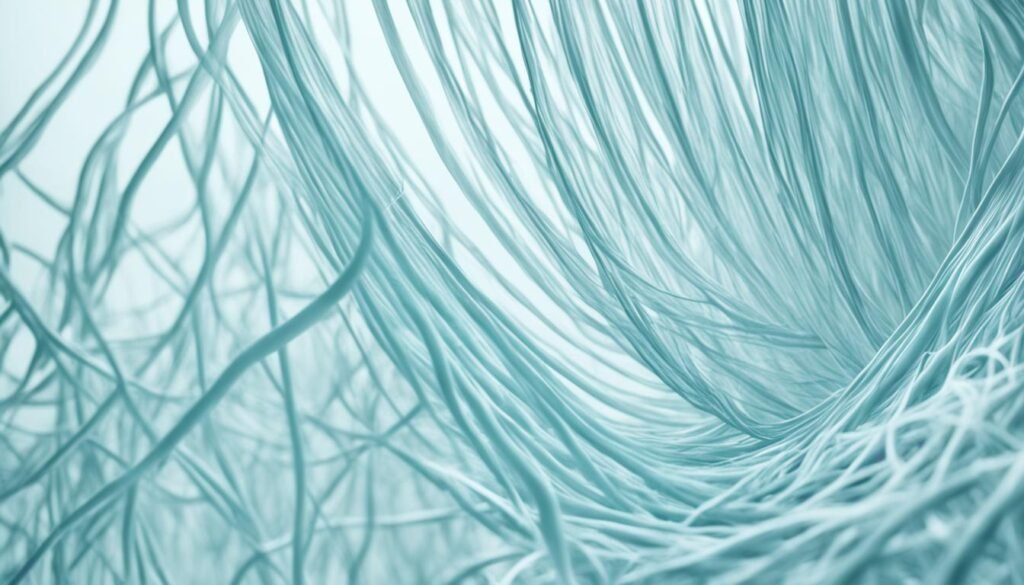
Alcohol consumption can have a significant impact on collagen, the protein responsible for giving the skin its structure and elasticity.
Regular and heavy alcohol consumption can lead to collagen degradation, resulting in a loss of skin firmness and elasticity.
This harmful effect of alcohol on collagen manifests as sagging skin, wrinkles, and a lack of resilience, leaving the skin looking aged and less supple.
Unfortunately, the damage caused by alcohol-induced collagen degradation is often irreversible, making it crucial to minimize alcohol intake in order to preserve healthy and youthful skin.
By reducing alcohol consumption, individuals can help maintain the integrity of collagen, promoting skin firmness and elasticity for a more vibrant and youthful appearance.
Alcohol’s Effects on Facial Skin Aging
Alcohol consumption can have a significant impact on the aging of facial skin. The detrimental effects of alcohol on the skin’s structure and elasticity can lead to various signs of aging, including the development of facial lines, volume loss, visible blood vessels, and reduced lip fullness.
Forehead lines, crow’s feet, and glabellar lines are common facial lines associated with alcohol consumption. These lines can be more pronounced and can contribute to an overall aged appearance.
Furthermore, alcohol-induced volume loss in the midface can result in a sunken appearance, making the skin look less plump and youthful.
Visible blood vessels, also known as spider veins, are another common sign of alcohol-related facial aging. Alcohol dilates blood vessels, causing them to become more noticeable on the skin’s surface.
Alcohol consumption can also lead to a reduction in lip fullness, resulting in thinner lips. This is often attributed to the damage alcohol causes to the skin’s structure and elasticity.
To visualize the effects of alcohol on facial skin aging, refer to the table below:
| Effects of Alcohol on Facial Skin Aging | Description |
|---|---|
| Facial Lines | Alcohol consumption can contribute to the development of forehead lines, crow’s feet, and glabellar lines. |
| Facial Volume Loss | Alcohol-induced volume loss can result in a sunken appearance, particularly in the midface. |
| Visible Blood Vessels | Alcohol can cause dilated blood vessels, leading to the appearance of spider veins on the skin. |
| Lip Fullness Reduction | Alcohol consumption can result in a reduction of lip fullness, leading to thinner lips. |
Understanding the effects of alcohol on facial skin aging is essential for maintaining overall skin health and a youthful appearance.
The Link Between Alcohol and Skin Inflammation
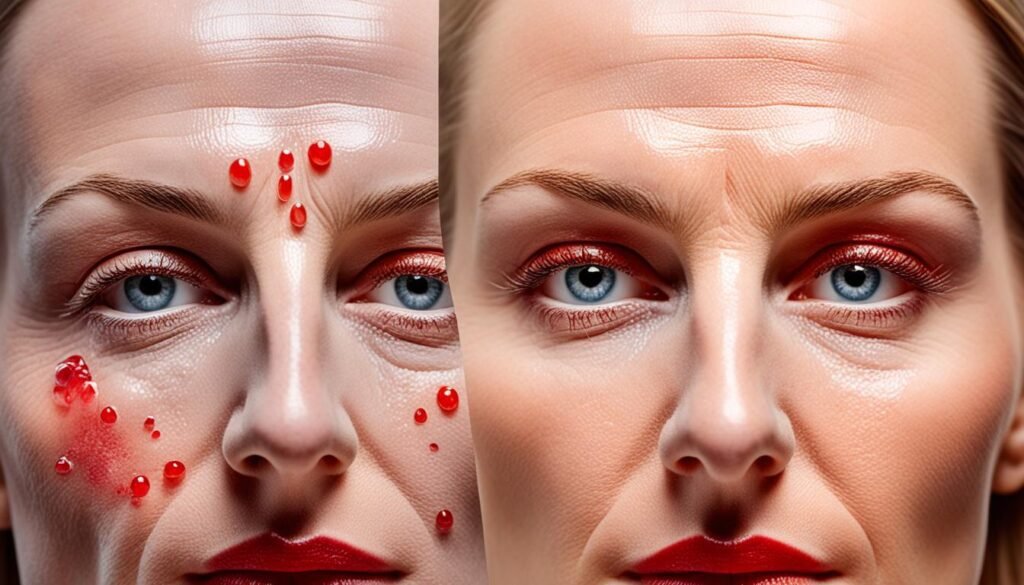
Alcohol consumption is known to cause skin inflammation, leading to redness and facial flushing. Alcohol activates histamine reactions in the skin, causing blood vessels to dilate and resulting in a flushed appearance. This inflammation is a result of the damage alcohol inflicts on the skin’s natural barrier function. Over time, chronic alcohol consumption can lead to a permanent redness of the skin that is difficult to reverse.
Alcohol-induced skin redness and facial flushing are common symptoms experienced by individuals who consume alcohol regularly. The dilated blood vessels, as a result of the histamine reaction, give the skin a flushed appearance. This visible effect can be distressing for those concerned about their skin’s appearance and overall well-being.
It is important to note that alcohol-related skin inflammation is not limited to the face; other areas of the body can also be affected. Skin inflammation can manifest as rashes, itching, and increased sensitivity to various stimuli. These symptoms can further contribute to discomfort and impair the skin’s natural barrier function, leaving it vulnerable to further damage and potential infections.
Reducing alcohol consumption and adopting a healthy lifestyle can help minimize skin inflammation and its associated symptoms. It is also beneficial to establish a consistent skincare routine that includes gentle cleansing, moisturizing, and protecting the skin from environmental stressors. Seeking medical advice from a dermatologist can provide customized guidance and recommendations for managing alcohol-induced skin inflammation.
Skin Concerns Associated with Alcohol Consumption

Excessive alcohol consumption can lead to a variety of skin concerns that can further contribute to the overall aging and deterioration of skin texture. Let’s explore some of the common skin problems associated with alcohol consumption:
1. Alcohol-Related Skin Infections
Alcohol weakens the skin’s natural defenses, making it more susceptible to infections and other microbial issues. Bacterial and fungal infections, such as cellulitis and ringworm, can occur more easily in individuals who consume excessive amounts of alcohol.
2. Alcohol and Spider Veins
Visible, dilated blood vessels, commonly known as spider veins, are a frequent consequence of alcohol consumption. Alcohol causes blood vessels to dilate, leading to the appearance of these branching red or purple lines on the skin, particularly on the face and legs.
3. Alcohol and Puffy Face
Alcohol can cause facial puffiness due to fluid retention and inflammation in the skin. Excessive alcohol consumption can lead to swelling and bloating, resulting in a puffy appearance, especially around the eyes and cheeks.
| Skin Concern | Description |
|---|---|
| Alcohol-Related Skin Infections | Increases susceptibility to bacterial and fungal infections |
| Spider Veins | Visible, dilated blood vessels on the skin |
| Puffy Face | Facial swelling and bloating, particularly around the eyes and cheeks |
These alcohol-related skin problems can cause discomfort and decrease self-confidence. It is essential to be aware of the potential impacts of alcohol on the skin and take steps to prioritize a healthy lifestyle and skincare routine to mitigate these concerns.
Other Ways Alcohol Impacts Aging
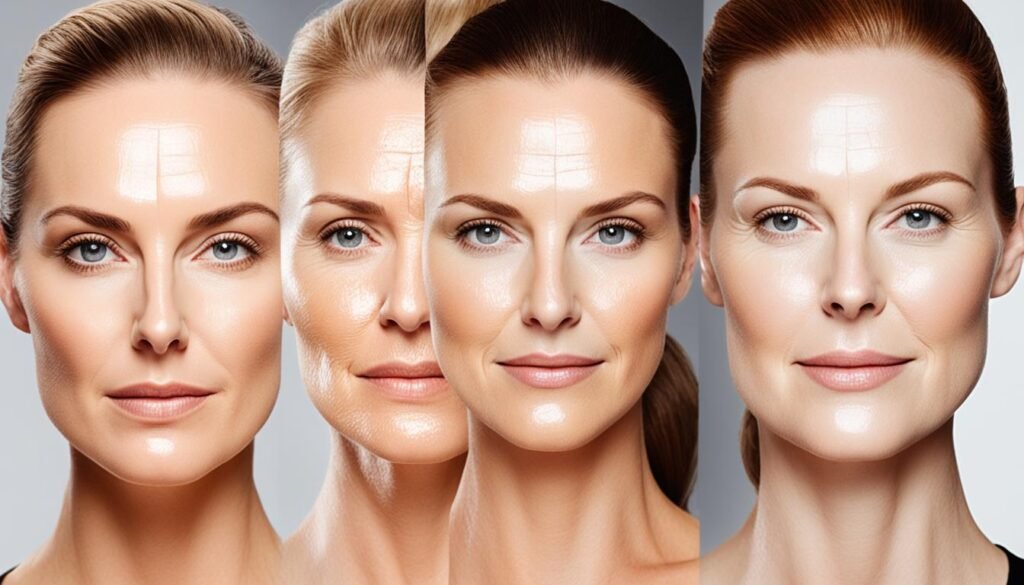
Alcohol consumption doesn’t just affect the skin; it can also have various impacts on the overall process of aging. Let’s explore some of these effects:
Alcohol’s Effects on Weight
Alcoholic beverages are often high in empty calories and sugar, which can contribute to weight gain. These empty calories provide little to no nutritional value, leading to increased calorie intake without providing essential nutrients.
Alcohol-Induced Hair Loss
Excessive alcohol consumption has been linked to hair loss. It is believed that nutritional deficiencies and hormonal imbalances caused by heavy drinking can disrupt the natural hair growth cycle, leading to hair thinning and loss.
Alcohol and Poor Hygiene
Alcohol abuse can also lead to poor hygiene habits. Individuals who excessively consume alcohol may neglect their skincare routines and dental care, resulting in oral health problems, skin infections, and an overall aged appearance.
These various impacts of alcohol on aging highlight the importance of moderation and responsible alcohol consumption for both our external appearance and overall well-being.
It’s important to maintain a healthy lifestyle and establish good self-care habits to preserve our youthfulness and vitality.
Conclusion
Alcohol consumption has a profound impact on skin texture and aging. The detrimental effects of excessive alcohol use on the skin are significant and wide-ranging. From dehydration and inflammation to collagen degradation and loss of skin elasticity, alcohol accelerates the aging process and leads to the development of visible signs of aging, such as wrinkles, sagging, and redness.
It is crucial to acknowledge that the damage caused by alcohol to the skin is often irreversible. To promote healthy and youthful skin, it is essential to minimize alcohol consumption and prioritize a comprehensive skincare routine as well as a healthy lifestyle. This includes maintaining proper hydration, nourishing the skin with antioxidants, and protecting it from harmful environmental factors.
By reducing alcohol intake and adopting a diligent skincare regimen, individuals can mitigate the negative impact of alcohol on their skin. Taking proactive steps to care for the skin can help maintain its texture, elasticity, and overall appearance, contributing to a youthful and radiant complexion in the long run.
FAQ
How does alcohol influence skin texture and aging?
Alcohol consumption can have significant effects on the texture and aging of the skin. It can deplete collagen levels, leading to a loss of elasticity and the development of wrinkles. Alcohol also dehydrates the skin and causes inflammation, resulting in visible dehydration, redness, and flushing. The damage caused by alcohol can accelerate the aging process, causing a dull complexion and sagging skin.
What are the effects of alcohol on the skin?
Alcohol consumption can lead to dehydration, inflammation, and a loss of skin elasticity. It can cause puffy and red faces, spider veins, and increased risks of skin infections. Alcohol also disrupts sleep patterns, leading to tired eyes and a tired appearance.
How does alcohol impact skin texture and aging?
Regular and heavy alcohol use can deplete collagen levels, resulting in a loss of skin firmness and elasticity. It can also impair the skin’s ability to regenerate, leading to accelerated aging and the development of wrinkles. Alcohol consumption can also decrease antioxidants in the skin, making it more vulnerable to damage and premature aging.
What is the relationship between alcohol and skin health?
Excessive alcohol consumption can weaken the skin’s natural defenses and lead to increased vulnerability to environmental damage. It dehydrates the skin, making it look dull and dry, and causes inflammation, resulting in redness and irritation. These factors contribute to accelerated skin aging and can lead to a range of skin concerns, from wrinkles to acne.
How does alcohol impact collagen and skin elasticity?
Alcohol consumption can lead to collagen degradation, resulting in a loss of skin firmness and elasticity. This can manifest as sagging skin, wrinkles, and a lack of resilience. The damage to collagen caused by alcohol is often irreversible, making it important to minimize alcohol intake for healthy and youthful skin.
What effects does alcohol have on facial skin aging?
Alcohol consumption is associated with facial lines, volume loss in the midface, visible blood vessels, and reduced lip fullness. These effects can be attributed to the damage alcohol causes to the skin’s structure and elasticity.
Is there a link between alcohol and skin inflammation?
Yes, alcohol consumption can cause skin inflammation, leading to redness and facial flushing. Alcohol activates histamine reactions in the skin, causing blood vessels to dilate and resulting in a flushed appearance.
What skin concerns are associated with alcohol consumption?
Excessive alcohol use can weaken the skin’s natural defenses, making it more susceptible to infections and other microbial issues. It can also lead to spider veins, characterized by visible, dilated blood vessels, and facial puffiness due to fluid retention and inflammation in the skin.
How does alcohol impact aging in other ways?
Alcohol consumption can contribute to weight gain, hair loss, and poor hygiene habits, all of which can contribute to an overall aged appearance.
What is the overall impact of alcohol on skin texture and aging?
The impact of alcohol on skin texture and aging is significant. It can lead to dehydration, inflammation, collagen degradation, and a loss of skin elasticity. These effects can result in wrinkles, sagging skin, and an aged appearance. Minimizing alcohol consumption and prioritizing skincare routines and a healthy lifestyle are essential for maintaining healthy and youthful skin.

